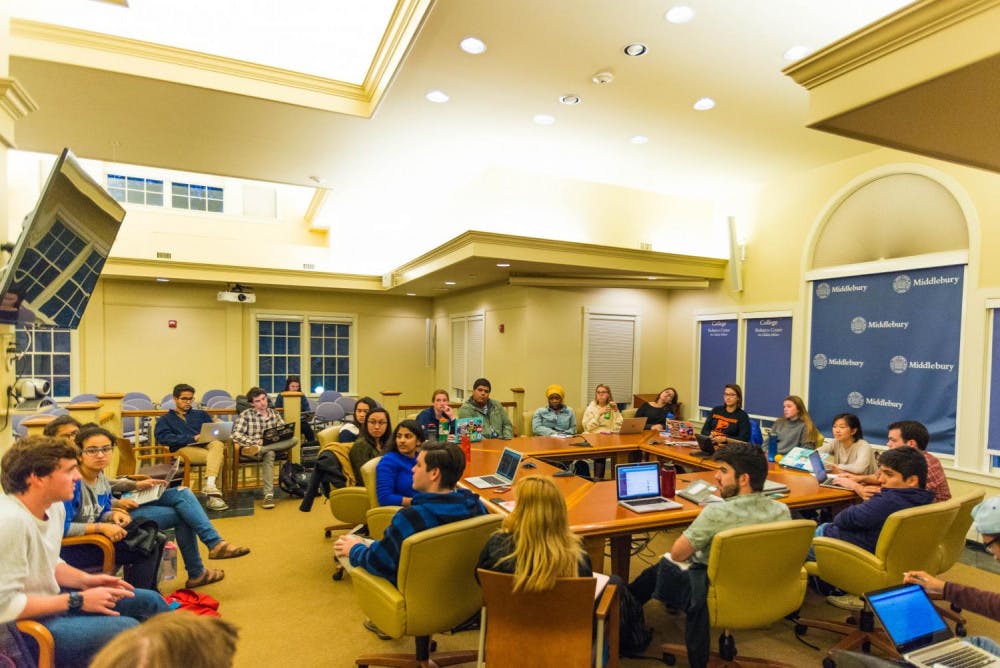Since the Student Government Association (SGA) presented its 13 Proposals for Community Healing at a town hall on April 23, the administration has agreed to address several of the SGA’s demands. For now, the administration’s actions appeared to appease the SGA Senate, who ended the academic year without fanfare weeks after several members threatened to dissolve the body if the administration failed to address their demands.
The proposals include calls for mandatory bias training for faculty, a black studies program and a new LGBTQ+ center, among others. Travis Sanderson ’19, a senior SGGA senator, said the proposals had succeeded in pushing the administration to act.
“The administration has capitulated to certain proposals due to students' pressure,” he said.
The proposals to which administrators agreed to address include adding another student to the Community Bias Response Team and beginning conversations on an LGBTQ+ center with a working group of faculty, staff and students. The administration also said it would commit further to plans to make the restrooms in all new buildings gender-inclusive, including those in the new building that will house the computer science department and faculty offices starting next year as well as those in buildings awaiting renovations, like Munroe Hall, Johnson Memorial Building and Warner Hall.
Sanderson said he appreciates the heightened level of transparency coming from the administration in announcing to the student body plans that are already underway, including the search for two new Health and Wellness positions who can work with students of underrepresented identities.
“The administration has also shown good faith in committing to bringing up the idea of a second student delegate to the Board of Trustees, increasing student representation in the Senior Leadership Group, and clarifying plans regarding Black Studies,” he said.
At the faculty meeting last Tuesday, faculty voted to accept the proposal for a Black Studies major, beginning in the 2019-2020 academic year. The proposal can be found at go/BLSTproposal.
Chief Diversity Officer Miguel Fernandez said a working group has been working on the proposal for almost two years.
“This is the 3rd attempt I am aware of by the faculty to create an ethnic studies major over the past 20 years,” Fernandez told The Campus. “The previous two failed for different reasons. As our discussions moved along, we ended up focusing on Black Studies.”
Fernandez added that college has not abandoned the idea of creating an Ethnic Studies major, which could further down the road encompass programs like Black Studies, Latinx Studies and Asian American Studies.
The administration also announced plans to offer bias training to faculty and staff come fall. According to Director of Education Renee Wells, the program will consist of a new “continuing education program” rather than stand-alone workshops.
“The goal is to provide space for faculty and staff to center inclusive practice in their individual work and to be part of a community of practitioners who are engaging with each other on an ongoing basis about what that can and does look like,” she said.
All faculty and staff will be able to register for any individual workshop, but none of the workshops will be mandatory.
On Tuesday, May 7, the Office of Institutional Diversity, Equity, and Inclusion (OIDEI) hosted a community conversation about a campus climate assessment report conducted over the last year as well as about the SGA’s proposals.
“Our goal is to create space for us to come together, discuss the climate concerns we face, share how these concerns impact our community, and collectively imagine a path forward that thoughtfully and intentionally addresses these challenges,” Fernandez wrote in an all-student email.
The first hour of the event was spent in small-group facilitated dialogues, followed by a second hour of a community dinner with remarks given by President Laurie L. Patton. The event as a whole allowed students to engage with representatives of the administration about campus climate concerns, as well as to understand the steps being taken to address such concerns such as the ones pushed in the 13 proposals.
Despite the steps taken by the administration to address specific student concerns, there is still skepticism about how much this progress actually means. John Gosselin ’20, the current Community Council co-chair and incoming senior senator who wrote an op-ed against the SGA’s threats to dissolve in April, said the administration’s response was limited by the rushed timeline the SGA proposed.
“The administration did not give sufficient responses because we did not give them sufficient time to formulate a good response,” he said. “Over the next year, the SGA should support these proposals by clarifying the language used to express them, inviting administrators to our weekly meetings, and asking trustees to Skype into our meetings. Instead of demanding certain proposals from the entire faculty, we should work with faculty amenable to our proposals to target our statements before making public pronouncements.”
Sanderson said he thinks students need to remain vigilant in making sure the administration delivers on its plans.
“Overall, I am moderately satisfied but feel there is a long way to go,” he said. “Financial transparency remains unaddressed, and many of the plans remain unrealized.”
Fernandez wrote in advance of last Tuesday’s event that “all the recommendations will be reviewed by OIDEI as we begin mapping out our strategic plan for diversity, equity and inclusion over the summer.”
Both Sanderson and Gosselin stressed the importance of working with administrators and faculty members on specific proposals to increase the likelihood that the 13 proposals will be realized. The Senate will look to pick up their work on these proposals in the fall and will continue to work with student advocates, faculty and administration on enacting specific proposals.
“This is one step, one of many,” Sanderson said, “and vigilance will be needed from both students and their senators.”

Porter Bowman ’21.5 is the Senior Opinions Editor.
He previously served as the Correspondent to the Student Government Association (SGA) and a Staff Writer for the News and Local sections.
Bowman is pursuing an International Politics and Economics major and a History minor.
During the summer of 2020, Bowman started a podcast called “Why Not U.S.?” where he interviewed young people in their 20s serving in political office across the country.
He also worked as a producer and researcher for “Trickeration,” an investigative sports podcast from iHeartMedia hosted by Campus alum Matt Waxman ’01.5.
When not watching the West Wing or finishing crossword puzzles, Bowman plays on the Middlebury varsity golf team alongside basketball, club tennis, and intramural volleyball.
He lost on Teen Jeopardy! in November 2016.




